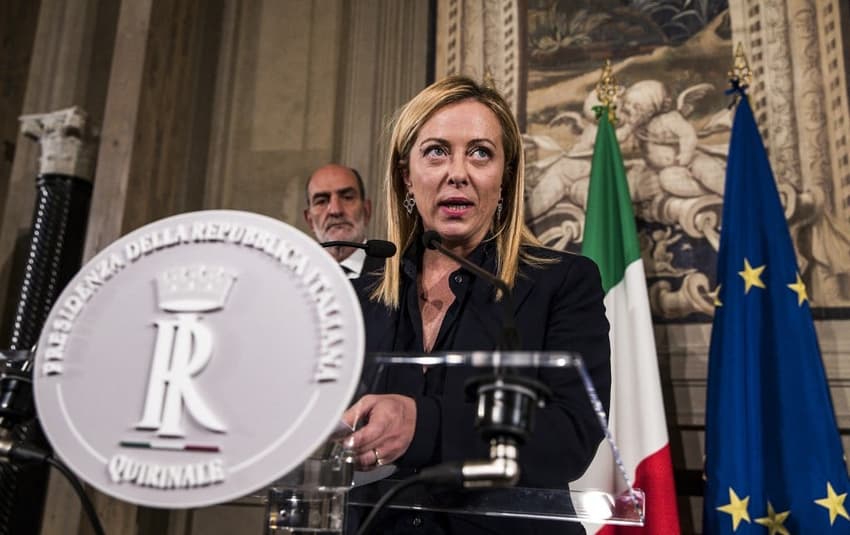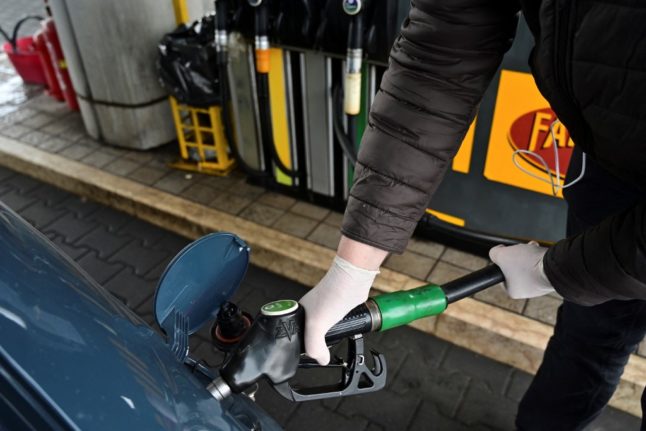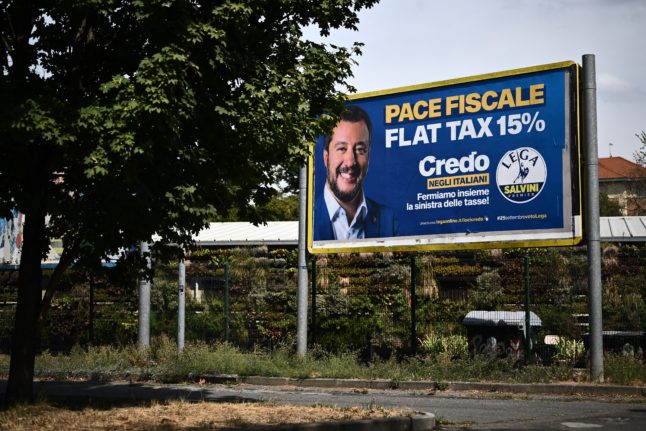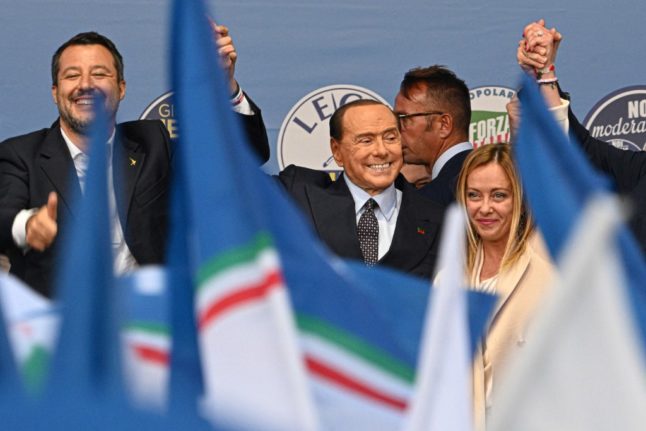The five biggest challenges facing the new Italian government

Giorgia Meloni has named her new government ministers. Here's a look at the most pressing issues the new administration will face and how it could deal with them.
Far-right leader Giorgia Meloni has been named Italian prime minister at a particularly difficult time, as soaring inflation and global uncertainty weigh on an already debt-laden economy.
Here are the major challenges facing the leader of the post-fascist Brothers of Italy party and her allies as they prepare to take power - and what plans the parties have to deal with them.
Energy crisis
Italy has been particularly hard hit by the energy crisis due to its dependence on gas imports.
Before the war in Ukraine, Italy imported 95 percent of the gas it consumes - about 40 percent of which came from Russia.
This has since dropped to about 10 percent after Draghi took steps to boost gas from other producers, while also accelerating a shift towards renewable energy.
Outgoing energy minister Roberto Cingolani said earlier this month Italy's stocks were full and "we should have a quiet winter season".

An extended discount on petrol and diesel at the pump is among measures promised by parties expected to form Italy's new government. Photo by MIGUEL MEDINA / AFP
But he warned the next government's approval of a regassification plant at Piombino in Tuscany, currently facing local opposition, is vital to maintaining supply.
Over the summer, Draghi’s cabinet signed off on a series of aid packages aimed at buffering the shock.
But with energy price rises showing no signs of abating, no doubt further measures to help struggling households and businesses will be needed over the winter.
So far, the right-wing coalition hasn’t gone into much detail about how they plan to tackle the energy crisis, with parties recently squabbling over whether or not the country’s public debt should be increased to allow for a new round of financial support.
In their joint manifesto, the parties said they will support a European on gas prices and that they aim to make the country “self-sufficient” in terms of energy production - though their proposed strategy of resorting to “clean and safe” nuclear energy is as vague as it is likely to be unpopular in Italy, where the public has twice refused to accept nuclear power.
Inflation and cost of living
Inflation was up 8.9 percent on the year in September, fuelled by rising prices of food (up 11.4 percent) and energy (up 44.5 percent), causing pain for households and businesses alike.
Many countries face similar issues, and the pressures are set to send Italy into technical recession next year, alongside Germany, according to the International Monetary Fund
Outgoing Prime Minister Mario Draghi's government has already pledged 66 billion euros ($65 billion) to help families and businesses with energy prices, using larger-than-expected tax receipts.
Business association Confindustria has called for 40 to 50 billion euros more to stop thousands of companies failing, but if economic growth slows, so will the budgetary room for manoeuvre.
In their campaign manifesto, the right-wing coalition said they plan on safeguarding families’ purchasing power by lowering VAT on all essential goods and by easing the tax burden (cuneo fiscale) on families, businesses and self-employed individuals, including with the introduction of a ‘flat tax’.
But despite the fact that such a system would actually clash with article 53 of the Italian Constitution, a flat tax set at 15 percent – that’s the rate proposed by the League’s leader, Matteo Salvini – would cost state coffers around 50 billion euros.
The coalition hasn’t yet given any details as to where such funds would be found.

Italy's league party has campaigned for election on promises of introducing a 'flat tax' at 15 percent. Photo by MARCO BERTORELLO / AFP
Employment and pensions
Shortly after taking up office, the new government will be called on to make a decision over the introduction of a national living wage – a policy which left-wing parties have been vocal about for months but that the bloc has opposed so far.
The next cabinet will also have to address the thorny issue of citizens’ income, Italy's welfare payment for those who are unemployed or in poverty, which has been the object of countless political skirmishes since its introduction in 2019.
EXPLAINED: What will a far-right government mean for Italy?
The coalition has pledged to abolish the citizens' income and replace it with “more effective social inclusion and job placement measures”, though no details have been given.
Finally, but perhaps most importantly to many in Italy, Meloni and her ministers will face reforming the pension system.
As of January 1st, 2023, Quota 102 – a stopgap pension law valid for 2022 only – will expire and the dreaded Legge Fornero (Fornero Law) will return. This means retirement will only be possible at 67 years of age or after 43 years of work for men and 42 for women.
Given the relatively short time at its disposal, the new cabinet is expected to draft another ‘temporary’ pension law covering the whole of 2023, thus postponing the pension system reform to 2024.
Recovery fund
After reaching all of the targets set for the first half of 2022, Italy is ready to move on to the next phase of its National Recovery and Resilience Plan (Piano Nazionale di Ripresa e Resilienza, or PNRR), a series of major reforms tied to a EU-wide post-pandemic aid package.
But since the collapse of Draghi’s cabinet in the middle of summer, little to no progress has been made on the 55 outstanding PNRR objectives for 2022, with the third round of funds – worth a total of 19 billion euros – currently hanging in the balance.
If the new government were to fail to meet the remaining targets by December 31st, Italy, which has received nearly 46 billion euros from the EU so far, would not receive the next round of funding.
READ ALSO: Italy’s building superbonus: How will it change after the election?
In the lead-up to the elections, the right-wing bloc said that they were planning on making “full use” of the 191.5 billion euros Italy has been allocated by the EU. But their manifesto also stated that, in view of “changed conditions and priorities”, the party leaders want to “revise” Italy’s PNRR agreement with Brussels.
No further details were given, and it isn’t yet clear what such a revision would entail.
War in Ukraine
As the war between Ukraine and Russia continues, Italy will have to convene with fellow EU states and NATO members to agree on a common approach to the conflict.
But the new cabinet’s stance on Russia’s invasion of Ukraine might not be in line with that of its predecessor.

Meloni’s right-wing coalition includes Matteo Salvini’s anti-immigrant League and Forza Italia, led by former premier Silvio Berlusconi. Photo by Andreas SOLARO / AFP
Two of the three key members of Italy’s next government, Matteo Salvini and Silvio Berlusconi, have long been close to Russia. The former, a long-time friend of Putin’s, caused outrage last week by defending Russia’s military aggression, whereas the latter has been critical of EU sanctions against the Kremlin.
New Italian PM, Meloni has backed European sanctions and the sending of weapons to Kyiv, though her previous support of Russia’s annexation of Crimea in 2014 raises justified doubts regarding the genuineness of her position.
The bloc’s programme emphasises party leaders’ commitment to respecting the “agreements made within the Atlantic Alliance” and supporting Ukraine.
However, the same manifesto also states that the coalition’s foreign policy will be centred around the “protection of national interests and the defence of the motherland”.
Comments
See Also
Far-right leader Giorgia Meloni has been named Italian prime minister at a particularly difficult time, as soaring inflation and global uncertainty weigh on an already debt-laden economy.
Here are the major challenges facing the leader of the post-fascist Brothers of Italy party and her allies as they prepare to take power - and what plans the parties have to deal with them.
Energy crisis
Italy has been particularly hard hit by the energy crisis due to its dependence on gas imports.
Before the war in Ukraine, Italy imported 95 percent of the gas it consumes - about 40 percent of which came from Russia.
This has since dropped to about 10 percent after Draghi took steps to boost gas from other producers, while also accelerating a shift towards renewable energy.
Outgoing energy minister Roberto Cingolani said earlier this month Italy's stocks were full and "we should have a quiet winter season".

But he warned the next government's approval of a regassification plant at Piombino in Tuscany, currently facing local opposition, is vital to maintaining supply.
Over the summer, Draghi’s cabinet signed off on a series of aid packages aimed at buffering the shock.
But with energy price rises showing no signs of abating, no doubt further measures to help struggling households and businesses will be needed over the winter.
So far, the right-wing coalition hasn’t gone into much detail about how they plan to tackle the energy crisis, with parties recently squabbling over whether or not the country’s public debt should be increased to allow for a new round of financial support.
In their joint manifesto, the parties said they will support a European on gas prices and that they aim to make the country “self-sufficient” in terms of energy production - though their proposed strategy of resorting to “clean and safe” nuclear energy is as vague as it is likely to be unpopular in Italy, where the public has twice refused to accept nuclear power.
Inflation and cost of living
Inflation was up 8.9 percent on the year in September, fuelled by rising prices of food (up 11.4 percent) and energy (up 44.5 percent), causing pain for households and businesses alike.
Many countries face similar issues, and the pressures are set to send Italy into technical recession next year, alongside Germany, according to the International Monetary Fund
Outgoing Prime Minister Mario Draghi's government has already pledged 66 billion euros ($65 billion) to help families and businesses with energy prices, using larger-than-expected tax receipts.
Business association Confindustria has called for 40 to 50 billion euros more to stop thousands of companies failing, but if economic growth slows, so will the budgetary room for manoeuvre.
In their campaign manifesto, the right-wing coalition said they plan on safeguarding families’ purchasing power by lowering VAT on all essential goods and by easing the tax burden (cuneo fiscale) on families, businesses and self-employed individuals, including with the introduction of a ‘flat tax’.
But despite the fact that such a system would actually clash with article 53 of the Italian Constitution, a flat tax set at 15 percent – that’s the rate proposed by the League’s leader, Matteo Salvini – would cost state coffers around 50 billion euros.
The coalition hasn’t yet given any details as to where such funds would be found.

Employment and pensions
Shortly after taking up office, the new government will be called on to make a decision over the introduction of a national living wage – a policy which left-wing parties have been vocal about for months but that the bloc has opposed so far.
The next cabinet will also have to address the thorny issue of citizens’ income, Italy's welfare payment for those who are unemployed or in poverty, which has been the object of countless political skirmishes since its introduction in 2019.
EXPLAINED: What will a far-right government mean for Italy?
The coalition has pledged to abolish the citizens' income and replace it with “more effective social inclusion and job placement measures”, though no details have been given.
Finally, but perhaps most importantly to many in Italy, Meloni and her ministers will face reforming the pension system.
As of January 1st, 2023, Quota 102 – a stopgap pension law valid for 2022 only – will expire and the dreaded Legge Fornero (Fornero Law) will return. This means retirement will only be possible at 67 years of age or after 43 years of work for men and 42 for women.
Given the relatively short time at its disposal, the new cabinet is expected to draft another ‘temporary’ pension law covering the whole of 2023, thus postponing the pension system reform to 2024.
Recovery fund
After reaching all of the targets set for the first half of 2022, Italy is ready to move on to the next phase of its National Recovery and Resilience Plan (Piano Nazionale di Ripresa e Resilienza, or PNRR), a series of major reforms tied to a EU-wide post-pandemic aid package.
But since the collapse of Draghi’s cabinet in the middle of summer, little to no progress has been made on the 55 outstanding PNRR objectives for 2022, with the third round of funds – worth a total of 19 billion euros – currently hanging in the balance.
If the new government were to fail to meet the remaining targets by December 31st, Italy, which has received nearly 46 billion euros from the EU so far, would not receive the next round of funding.
READ ALSO: Italy’s building superbonus: How will it change after the election?
In the lead-up to the elections, the right-wing bloc said that they were planning on making “full use” of the 191.5 billion euros Italy has been allocated by the EU. But their manifesto also stated that, in view of “changed conditions and priorities”, the party leaders want to “revise” Italy’s PNRR agreement with Brussels.
No further details were given, and it isn’t yet clear what such a revision would entail.
War in Ukraine
As the war between Ukraine and Russia continues, Italy will have to convene with fellow EU states and NATO members to agree on a common approach to the conflict.
But the new cabinet’s stance on Russia’s invasion of Ukraine might not be in line with that of its predecessor.

Two of the three key members of Italy’s next government, Matteo Salvini and Silvio Berlusconi, have long been close to Russia. The former, a long-time friend of Putin’s, caused outrage last week by defending Russia’s military aggression, whereas the latter has been critical of EU sanctions against the Kremlin.
New Italian PM, Meloni has backed European sanctions and the sending of weapons to Kyiv, though her previous support of Russia’s annexation of Crimea in 2014 raises justified doubts regarding the genuineness of her position.
The bloc’s programme emphasises party leaders’ commitment to respecting the “agreements made within the Atlantic Alliance” and supporting Ukraine.
However, the same manifesto also states that the coalition’s foreign policy will be centred around the “protection of national interests and the defence of the motherland”.
Join the conversation in our comments section below. Share your own views and experience and if you have a question or suggestion for our journalists then email us at [email protected].
Please keep comments civil, constructive and on topic – and make sure to read our terms of use before getting involved.
Please log in here to leave a comment.